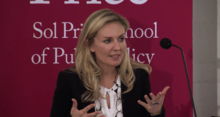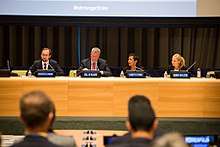Institute for Strategic Dialogue
The Institute for Strategic Dialogue (ISD) is a London-based think tank concerned with extremism.[1] Its Founding CEO is Sasha Havlicek.[2]
 | |
| Formation | 2006 |
|---|---|
| Headquarters | London, W1 UK |
Director and CEO | Sasha Havlicek |
Staff | 48 |
| Website | www.isdglobal.org |
Approach

ISD's approach is to counter extremism and the ideologies that underpin it in ways that are practical, affordable, effective, and scalable. ISD operates through five interconnected pillars of work:
- Research & Insight: ISD research combines in-depth analysis of audience, networks and content to accurately interpret the threat of violent extremism online and offline. ISD research has been consistently ahead of the curve, predicting developments in extremism and informing responses to emerging challenges. It has helped to reveal previously unseen challenges, enabling us and others to design effective and forward thinking programmes.
- Communication & technology: ISD works on the application of data, technology and marketing tactics to mount proportional responses to extremist messaging. ISD leads major programmes with Facebook, Google and Microsoft.
- Education: ISD’s innovative global education programmes and resources build the resilience of young people to extremism through the development of vital skills, from critical thinking to social and emotional learning. ISD research has shown that education plays a critical role in undermining extremist ideologies and support for extremist groups, disrupting their activities at the roots.
- Grassroots networks: Extremism is a global phenomenon that is ill served by top-down approaches. Isd works to empower and facilitate independent, grassroots networks to take the lead at the front lines, applying their local expertise and credibility in a way that delivers impact at scale.
- Policy & advisory: ISD provides strategic advice to over 15 governments and 100 cities worldwide, allowing us to facilitate the exchange of best practice between policy-makers and practitioners to coordinate counter-extremism programmes. ISD also provides high-level strategic advice to the tech sector to harmonise efforts with governments and civil society.
Programme of work
ISD runs a wide ranging programme of work on extremism which ranges from traditional research papers[4] through to the facilitation of practitioners networks[5][6] and the development of counter narrative tools.[7] Their work ranges from work on Islamist extremism[8] through to work on the Far Right[9] and even integration[10] Major programmes include:
- Against Violent Extremism (AVE) network: a global network of former extremists, survivors of violence and interested individuals from the public and private sectors - working together to counter all forms of violent extremism.[11]
- Youth Civil Activism Network (YouthCAN): the leading global youth network of counter-extremism activists, YouthCAN provides marketing and digital tools to spur the creation of counter-narrative content for the Millennial generation.[12]
- Online Civil Courage Initiative (OCCI): builds on ISD’s existing partnership with Facebook to develop new understanding and responses to the challenge of hate speech and violent extremism on social media.
- Extreme Dialogue: a multi-media education resource for teachers and social workers centred on compelling films of ‘formers and survivors’ of extremism.[13]
- One to One: an innovative engagement initiative that facilitates interventions between former extremists and young people who show serious extremist tendencies.
- Strong Cities Network (SCN): the first ever global network of municipal-level policy makers and practitioners united in building social cohesion and community resilience to counter violent extremism in all its forms.[14]
- Policy Planners’ Network: ISD manages the PPN, a European inter-governmental network of policy chiefs from integration and interior ministries created to systematise cross-border exchange and develop upgraded, coordinated responses to the dual challenges of integration and extremism.[15]
In delivering their projects ISD partners with governments[16] and leaders of the technology sector such as Google.[17] ISD also chairs the EU’s Radicalisation Awareness Network (RAN) working group on the internet and social media.[18]
Strong Cities Network

Launched at the United Nations in September 2015, the Strong Cities Network (SCN) is the first ever global network of mayors, municipal-level policy makers and practitioners united in building social cohesion and community resilience to counter violent extremism in all its forms[19].
Led by ISD and comprising more than 100 cities, the SCN builds collaboration between mayors, political actors and frontline teams to tackle polarisation, hate and violence in local communities in every major global region. The network catalyses, inspires and multiplies community-centered approaches and action to counter violent extremism through peer learning and expert training. It operates with a set of fundamental principles, agreed by all members, that protect and promote human rights and civil liberties in all aspects of its work to prevent violent extremism.
Google Innovation Fund
In 2017 Google.org and ISD partnered to deliver a £1m innovation fund to counter hate and extremism in the UK.[20] The fund aims to support innovative projects on and offline that seek to disrupt, undermine, counter or provide positive alternatives to hate and extremism.
The Innovation Fund is designed to support new educational approaches, unique community projects and cutting edge technologies, laying the foundations for a more effective, innovative and cohesive civil society response to hate and extremism in the future.
Internet Citizens

In 2017, ISD delivered a series of 'Be Internet Citizen workshops' youth centres across the UK in 2017. In 2018 ISD started working with Google to roll out the workshops into schools across the country, as well as supporting teachers and the youth sector with training and resources to deliver the curriculum independently.
The Internet Citizens Curriculum aims to explain fake news, echo chambers and filter bubbles, helping young people become more confident in forming their opinions online and develop an increased critical awareness of the use of the content they consume
Research and publications
- Ebner, Julia; Davey, Jacob (March 2018). "Mainstreaming Mussolini: How the Extreme Right Attempted to 'Make Italy Great Again' in the 2018 Italian Election" (PDF).
- Davey, Jacob; Birdwell, Jonathan; Skellett, Rebecca (February 2018). "Counter-Conversations: A model for direct engagement with individuals showing signs of radicalisation online" (PDF).
- Harrasy, Anisa; Amanullah, Zahed (February 2018). "Between Two Extremes: Responding to Islamist and tribalist messaging online in Kenya during the 2017 elections" (PDF).
- Reynolds, Louis (December 2017). "Internet Citizens: Impact Report" (PDF).
- Applebaum, Anne; Pomerantsev, Peter; Smith, Melanie; Colliver, Chloe (December 2017). "Make Germany Great Again" (PDF).
- Davey, Jacob; Ebner, Julia (October 2017). "The Fringe Insurgency" (PDF).
External links
References
- "Europe's Middle East Mission". ISN blog. 25 February 2014.
- "Advisory Board, Sasha Havlicek". brismes.ac.uk. British Society for Middle Eastern Studies.
- "Global Summit on Homegrown Violent Extremism: Keynote - Sasha Havlicek". USC Sol Price School of Public Policy. 2017 – via YouTube.
- Ramalingam, Vidhya. "Preventing and Countering Far-Right Extremism: European Cooperation, Country Reports". academia.edu.
- "About Us". CounterExtremism.org. The Policy Planners Network on Countering Radicalisation and Polarisation (PPN).
- "Can a social network fight 'extremism'?". Al Jazeera. May 2012. Archived from the original on 2012-06-15. Retrieved 2013-07-09.
- "Fourth round of successful Kanishka Project counter-terrorism research proposals". securitepublique.gc.ca. Public Safety Canada.
- Briggs, Rachel (January 2012). "The Changing Face of Al Qaeda" (PDF). strategicdialogue.org. Institute for Strategic Dialogue. Archived from the original (discussion paper) on 2013-05-12.
- Ramalingam, Vidhya (February 2014). "Old Threat, New Approach: Tackling the Far Right Across Europe" (PDF). strategicdialogue.org. Institute for Strategic Dialogue.
- Ramalingam, Vidhya (November 2013). "Integration: What Works?" (PDF). strategicdialogue.org. Institute for Strategic Dialogue. Archived from the original (PDF) on 2013-11-29.
- "Network to combat extremism and gang culture launched". BBC News. 25 April 2012.
- "YouthCAN". youthcan.net. Retrieved 2017-03-06.
- "Extreme Dialogue". extremedialogue.org. Retrieved 2017-03-06.
- "Strong Cities Network". strongcitiesnetwork.org. Retrieved 2017-03-06.
- "Policy Planners' Network". ISDEP.eu. Archived from the original on 2014-04-07.
- "Government tackles online radicalisation and 'foreign fighters'". Copenhagen Post. Copenhagen, Denmark.
- "How Can Technology Help Society Counter Violent Extremism?". Google.com. Network Against Violent Extremism, Google Ideas.
- "About RAN". ec.europa.eu. RAN Internet and Social Media, European Commission-Home Affairs.
- "Strong Cities Network". strongcitiesnetwork.org.
- "Google Launches £1M Innovation Fund with ISD to develop Solutions to Hate and Extremism". isdglobal.org (Press release).